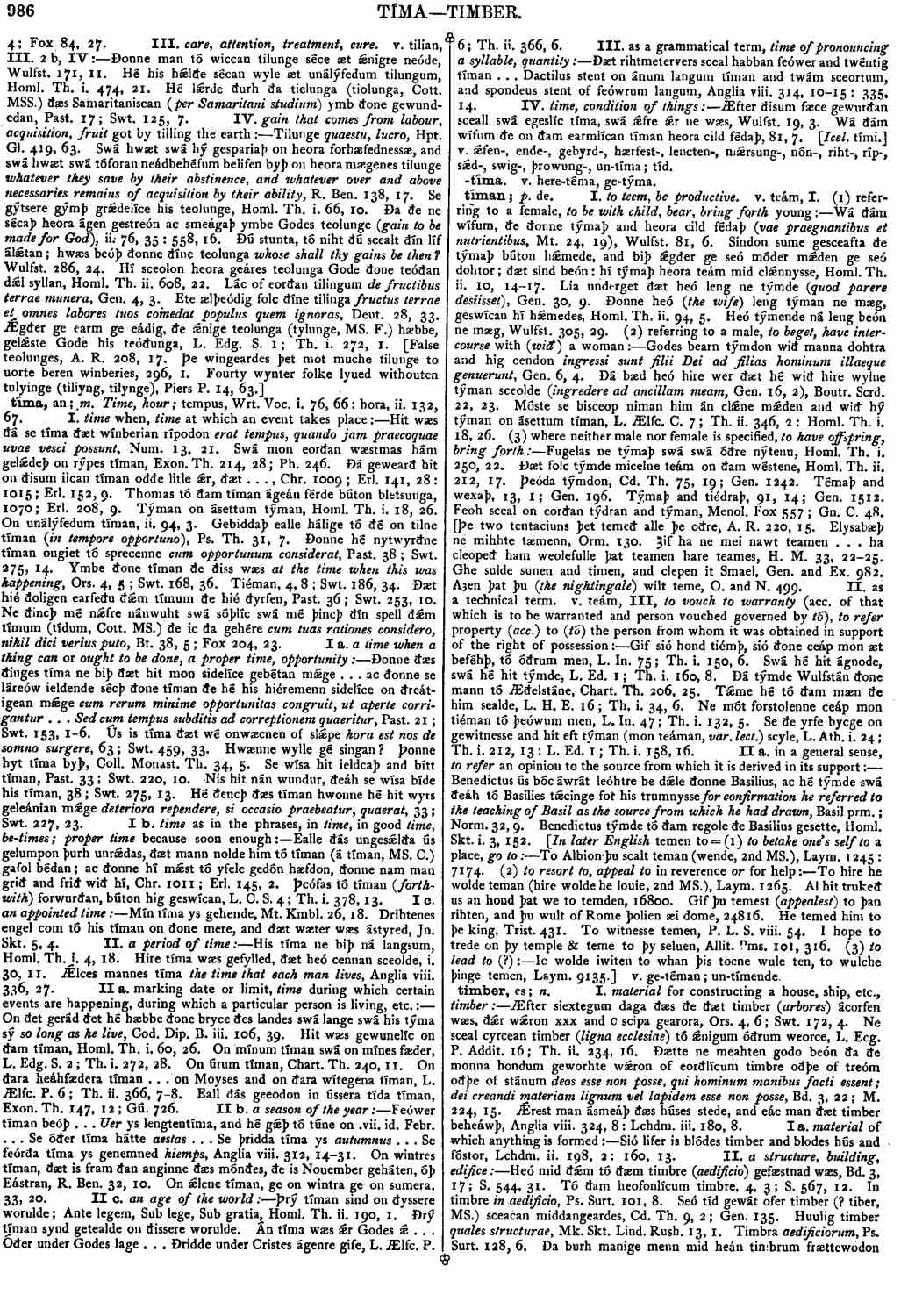tíman
- verb [ weak ]
-
Wá ðám wífum, ðe ðonne týmaþ and heora cild fédaþ (
vae praegnantibus et nutrientibus,
- Mt. 24, 19), Wulfst. 81, 6.
-
Sindon sume gesceafta ðe týmaþ búton hǽmede, and biþ ǽgðer ge seó móder mǽden ge seó dohtor; ðæt sind beón: hí týmaþ heora teám mid clǽnnysse,
- Homl. Th. ii. 10, 14-17.
-
Lia underget ðæt heó leng ne týmde (
quod parere desiisset
),- Gen. 30,
9.
-
Ðonne heó (
the wife
) leng týman ne mæg, geswícan hí hǽmedes,- Homl. Th. ii. 94, 5.
-
Heó týmende ná leng beón ne mæg,
- Wulfst. 305, 29.
-
Godes bearn týmdon wið manna dohtra and hig cendon
ingressi sunt filii Dei ad filias hominum illaeque genuerunt,
- Gen. 6, 4.
-
Ðá bæd heó hire wer ðæt hé wið hire wylne týman sceolde (
ingredere ad ancillam meam,
- Gen. 16, 2), Boutr. Scrd. 22, 23.
-
Móste se bisceop niman him án clǽne mǽden and wið hý týman on ásettum tíman,
- L. Ælfc. C. 7; Th. ii. 346, 2: Homl. Th. i. 18, 26.
-
Fugelas ne týmaþ swá swá óðre nýtenu,
- Homl. Th. i. 250, 22.
-
Ðæt folc týmde micelne teám on ðam wéstene,
- Homl. Th. ii. 212, 17.
-
Þeóda týmdon,
- Cd. Th. 75, 19; Gen. 1242.
-
Témaþ and wexaþ,
- 13, 1; Gen. 196.
-
Týmaþ and tiédraþ,
- 91, 14; Gen. 1512.
-
Feoh sceal on eorðan týdran and týman,
- Menol. Fox 557; Gn. C. 48. [Þe
-
Elysabæþ ne mihhte tæmenn,
- Orm. 130.
-
Ȝif ha ne mei nawt teamen . . . ha cleopeð ham weolefulle þat teamen hare teames,
- H. M. 33, 22-25.
-
Ghe sulde sunen and timen, and clepen it Smael,
- Gen. and Ex. 982.
-
Aȝen þat þu (
the nightingale
) wilt teme,- O.
and N. 499.
-
Gif sió hond tiémþ, sió ðone ceáp mon æt beféhþ, tó óðrum men,
- L. In. 75; Th. i. 150, 6.
-
Swá hé hit ágnode, swá hé hit týmde,
- L. Ed. I; Th. i. 160, 8.
-
Ðá týmde Wulfstán ðone mann tó Æðelstáne,
- Chart. Th. 206, 25.
-
Tǽme hé tó ðam mæn ðe him sealde,
- L. H. E. 16; Th. 1. 34, 6.
-
Ne mót forstolenne ceáp mon tiéman tó þeówum men,
- L. In. 47; Th. i. 132, 5.
-
Se ðe yrfe bycge on gewitnesse and hit eft týman (mon teáman, var. lect.) scyle, L. Ath. i. 24; Th. i. 212, 13: L. Ed. 1; Th. i. 158, 16. II a. in a general sense, to refer an opinion to the source from which it is derived in its support :-- Benedictus ús bóc áwrát leóhtre be dǽle ðonne Basilius, ac hé týmde swá ðeáh tó Basilies tǽcinge for his trumnysse
for confirmation he referred to the teaching of Basil as the source from which he had drawn,
Basil prm.;- Norm.
32, 9.
-
Benedictus týmde tó ðam regole ðe Basilius gesette,
- Homl. Skt. i. 3, 152.
- Laym. 1245: 7174.
- Laym. 1265.
- Trist.
431.
- P. L. S. viii. 54.
- Allit. Pms. 101,
316.
- Laym. 9135.
Bosworth, Joseph. “tíman.” In An Anglo-Saxon Dictionary Online, edited by Thomas Northcote Toller, Christ Sean, and Ondřej Tichy. Prague: Faculty of Arts, Charles University, 2014. https://bosworthtoller.com/30505.
Checked: 0